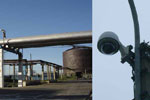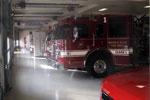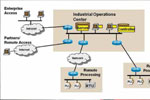September 2011
Features

Great Lakes Maritime Academy leverages recorded IP video to
By Anthony Incorvati
When your course curriculum includes 276 days at sea, it’s obvious that your college experience will be a little different from the average undergrad. Living off campus takes on a whole new meaning, and sleeping through just one class might lead to a false step into the open ocean. Training to become a merchant marine officer is serious work, and the Great Lakes Maritime Academy has been effectively preparing its cadets on the shores of Lake Michigan for more than 40 years.
By Laura Williams
Given the myriad options businesses have when choosing mass notification systems, we set out to find what factors system managers should take into account when they select a solution.

Security act regulates who has access to maritime industries
By Kim Rahfaldt
The Maritime Transportation Security Act of 2002 required the Department of Homeland Security to secure America’s ports by implementing regulations that prevents most individuals from having unescorted access to secure facilities and vessels. The law mandates that all individuals who qualify for unescorted access receive a biometric credential to show proof of identification. Born from this directive was the Transportation Workers Identity Credential (TWIC), issued to individuals who meet the eligibility requirements.

Video surveillance provides solution for Romania’s largest refinery
By Mark S. Wilson
The vital role oil refineries play in the world’s economy has put hydrocarbon and petrochemical facilities atop terrorist lists of potential targets. Additionally, refinery officials typically want to keep a critical eye on each strategic component within their facilities.

Beyond the glamour, Beverly Hills faces the same fire and security issues as everyone else
By Beth Welch
Beverly Hills, Calif., has been glamorized in countless film and television depictions as the home of the wealthy and famous. Beyond the glamour, though, it has municipal management issues much like those any city faces.

Industrial networks see advances in security and surveillance
By Jim Krachenfels
Industrial security has always been a challenge, with often vast areas needing coverage that is effective—and efficient. As with many other technologies, advances in electronic security and surveillance, both physical and cyber, have created new challenges as they have addressed and conquered earlier problems.

ONVIF standard extinguishes open debate
By Oliver Vellacott
The debate about so-called “open” and “closed” IP video surveillance solutions has been ongoing for some time. Each side suggests that its approach is better for the end user, with a reasonable amount of disinformation being added for good measure. To a large extent, this debate is being extinguished with the release of the ONVIF standard. However, even with this standard, defining exactly what is meant by an “open” system is still up for debate.

Be heard and understood, because people’s safety depends on it
By Christa Poss
For the life safety community, mass notification is a relatively new concept. It arose from emergency management personnel’s inability to communicate with and direct building occupants during emergencies. Since the publication of the Unified Facilities Criteria, many U.S. military facilities throughout the world have installed mass notification systems. The criteria outlined the design, operation and interfaces required for mass notification in military facilities, and the Defense Department approved the final version for mass notification in 2008.
Providing real-time information to building occupants
By Peter Ebersold
The term mass notification originated with the Unified Facilities Criteria (UFC) document 4-021-01, titled Design and O&M: Mass Notification Systems, created by the Department of Defense (DoD). The UFC outlines the design, operation and maintenance of mass notification systems (MNSs) required on all DoD properties, including posts for the Air Force, Army, Marine Corps and Navy.

NASCAR racing team enhances fan experience while maintaining a safe environment
By Steve Gorski
The world of professional sports is exciting and constantly evolving. The sheer volume of events, athletes and fans, though, makes it seemingly impossible to secure the environment.

Chinese insurance company sought total protection
By Eric Chiu
Established in 1991, China Pacific Insurance Co. Ltd. (CPIC) is one of the largest insurance companies in China, with investment assets of $56.56 billion.
Departments

By Ralph C. Jensen
The 10 years since the tragedy of the Sept. 11 attacks seem to have swept by like the winds rushing down the Oklahoma plains. Do you remember where you were that day?

Will the next major hack attack be casus belli for a traditional act of war?
By Ronnie Rittenberry
If, like me, you’re geeky enough to still recall certain scenes from 1983’s “WarGames” (and right now I can still pretty clearly see Barry Corbin as the general saying to Dabney Coleman’s character, “After very careful consideration, sir, I’ve come to the conclusion that your new defense system sucks”), then the news permeating the summer about the Pentagon publishing (in part) its first formal cyberwar strategy probably was no big surprise. In fact, the only eye-opening part might have been that prior to this summer it didn’t already have one.

Superior images and efficiency are driving megapixel video into the mainstream
By Scott Schafer
Numerous factors are accelerating the video surveillance industry’s transition to IP-based systems, including ease of integration, flexibility to interface with other systems and the ability to make video accessible on the enterprise level.